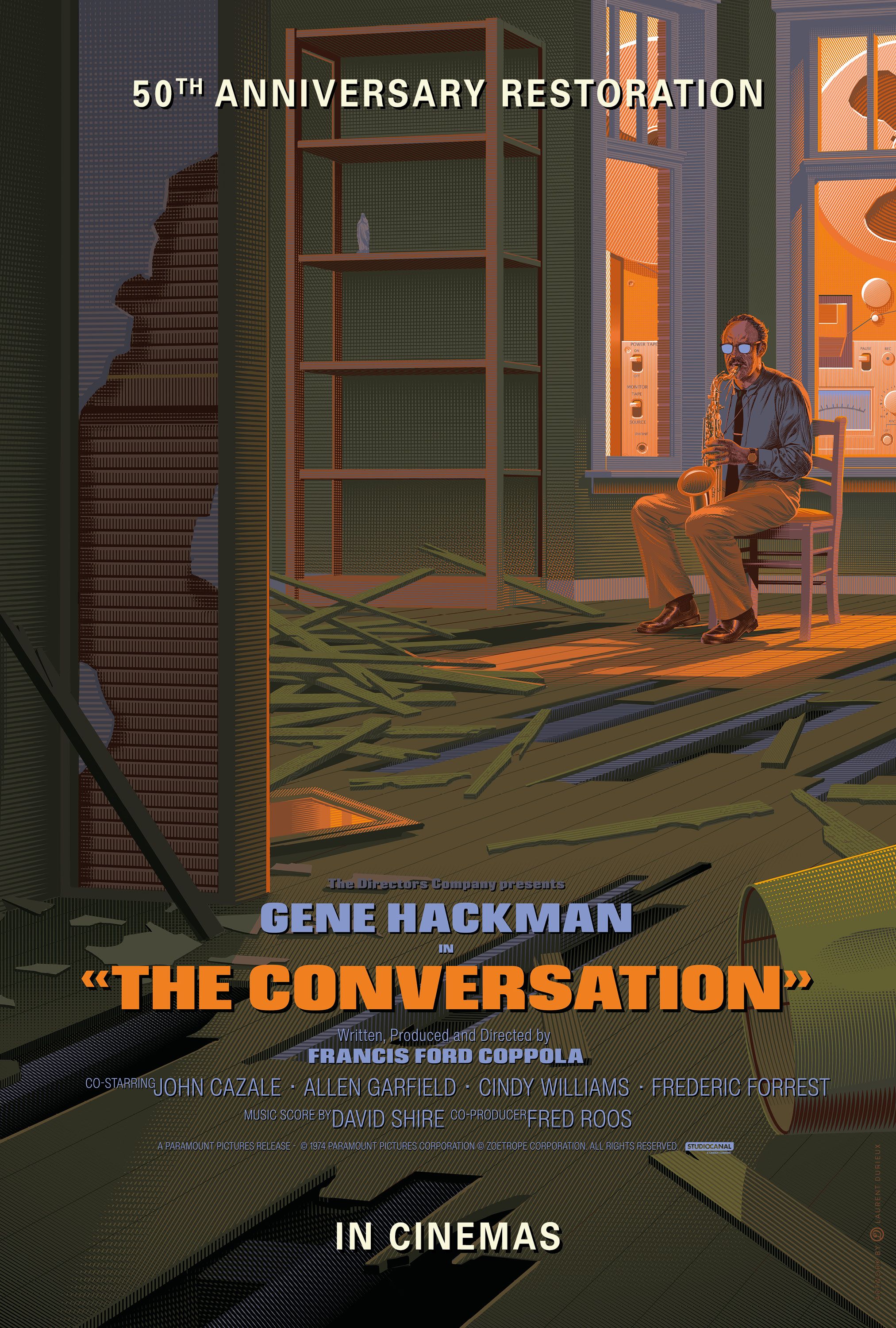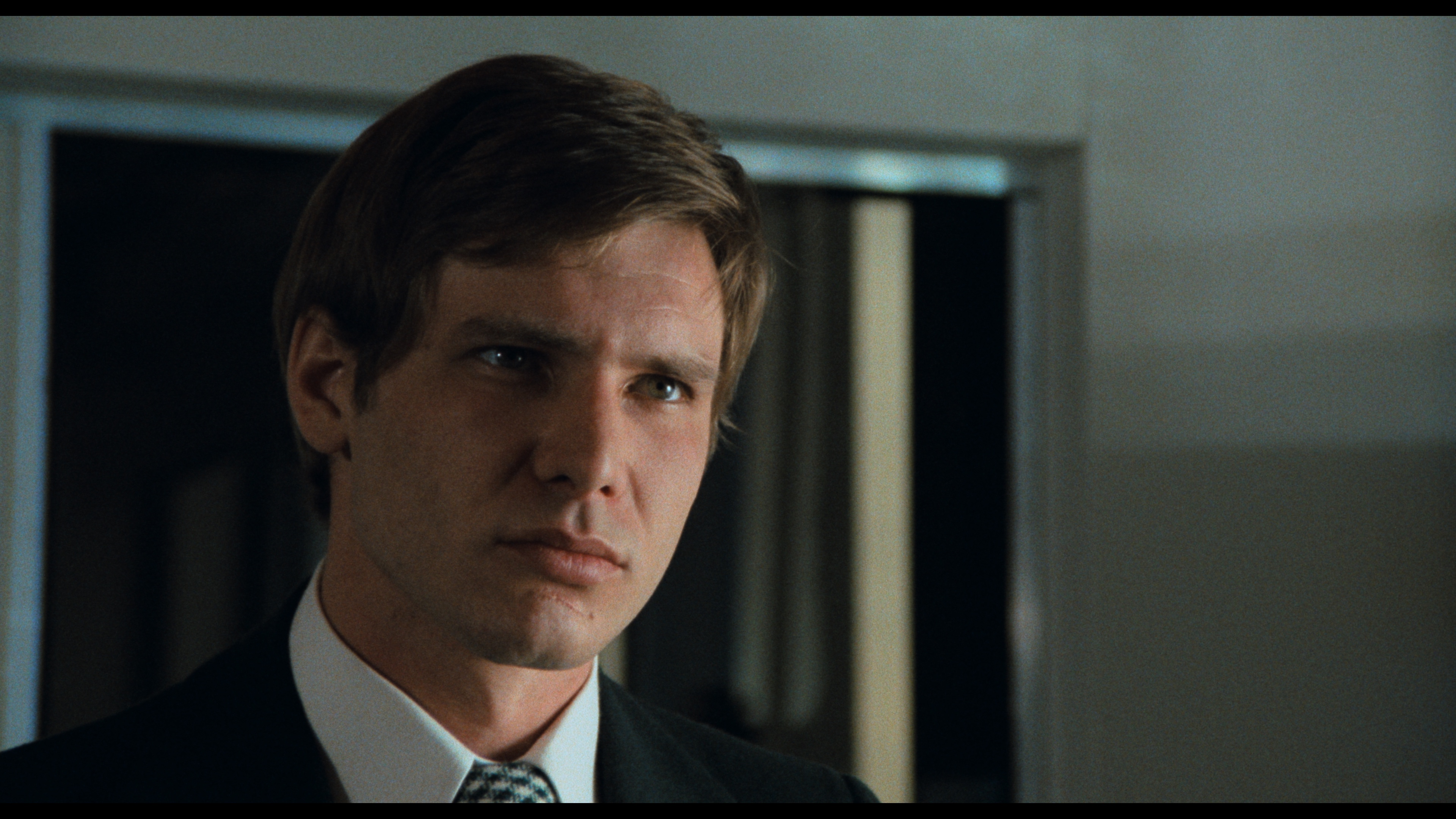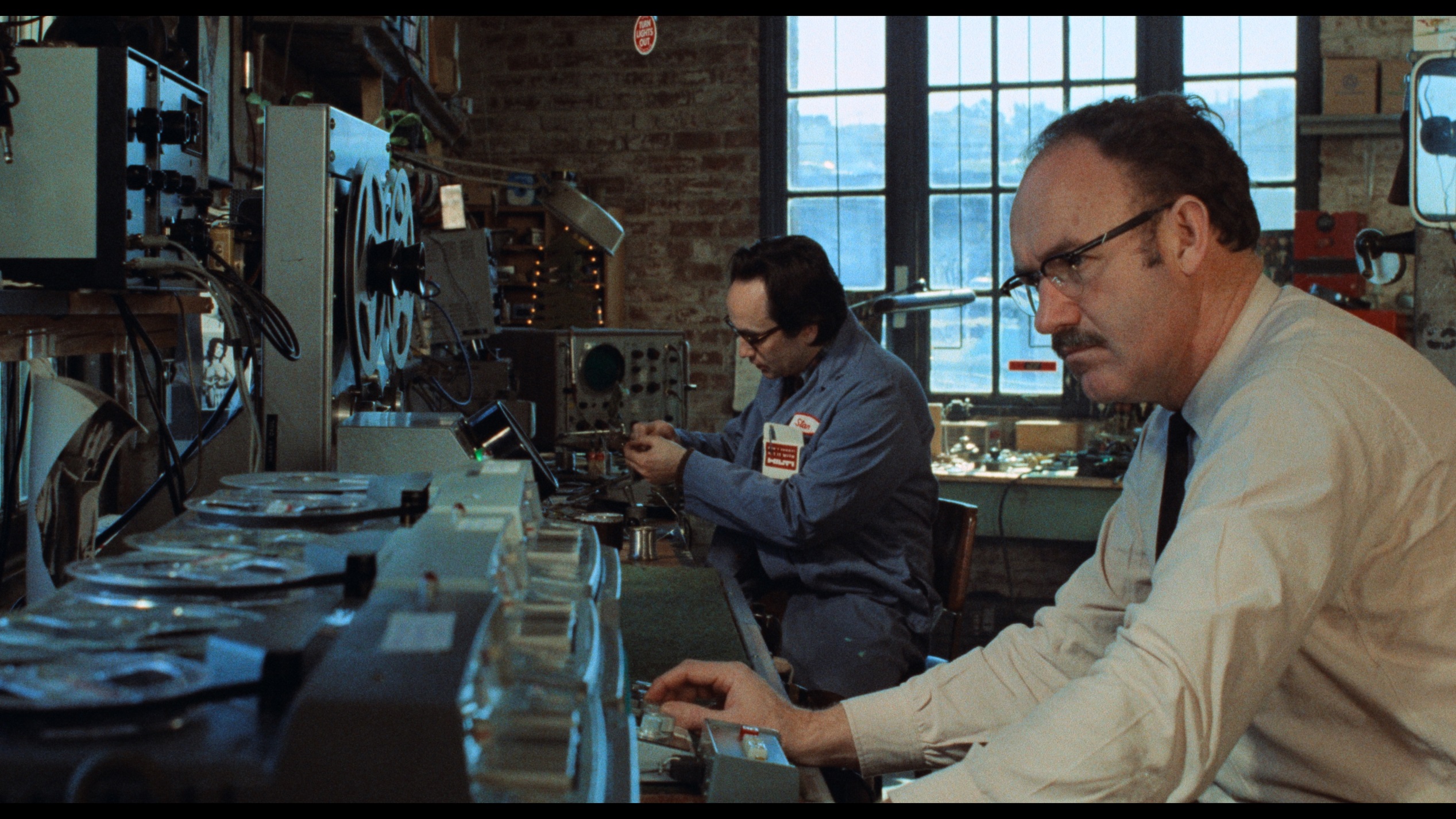Blu-ray: The Conversation | reviews, news & interviews
Blu-ray: The Conversation
Blu-ray: The Conversation
Coppola's other Seventies masterpiece, as Gene Hackman's sound man is dismantled by pre-Watergate paranoia

“I don’t care what they’re talking about,” says the best bugger in the business, Harry Caul (Gene Hackman). “I just want a nice fat tape.”
In the minor-key masterpiece Francis Ford Coppola made in the brief interlude between The Godfather (1972) and The Godfather Part 2 (1974), Harry is a freelance genius of surveilled sound, whose mask of isolated control is incrementally dismantled by a recording of a clandestine lovers’ rendezvous in San Francisco. “It’s not an ordinary meeting,” he realises. “It makes me feel something.”
The Conversation is a shadowy tone poem written and directed by Coppola, given melancholy inner life by his then brother-in-law David Shire’s lonesome piano score, and recomposed by Walter Murch’s sound design and edit. The lovers’ seemingly innocuous exchange becomes part of its mosaic, softly edited into recurring memories, Caul/Coppola’s camera angles turned around, words so objectively isolated they become subjectively slippery, a vortex sucking Harry onto its rocks. His usual routine is disrupted by his employer’s menacing underling (Harrison Ford, darkly cocky in an early, self-defined role), and murder seems imminent. Can these two young people be saved? Is sordid, secret Harry a knight after all, a West Coast forerunner of Travis Bickle?
 Harry is an amateur jazz saxophonist in his only private pleasure, and Hackman is the film’s soloist. Cast against type and nature soon after playing macho Detective Popeye Doyle in The French Connection (1971), his clenched masculinity becomes tragic. He lives in an apartment painted pastel-green as if underwater, moving through it while Coppola’s camera stays deliberately still, spying. It is Edward Hopper-lonely, yet warm compared to the grey steel grid of the corporate high rise where his employer (an uncredited Robert Duvall) has his elite eyrie. Straight-backed in his semi-transparent mac – part gumshoe, part dirty middle-aged man – and shot in noir shadow, he is an unlikely, romantic figure. His secret tenderness is tempted from him by a hostess who is also for hire (Elizabeth MacRae, cast for her Tennessee Williams qualities), as Shire’s score haunts and deepens him. “I always thought he was somebody’s baby boy,” the taped female lover (Cindy Williams) says of a sleeping tramp, and she could be talking about Harry’s old, innocent soul as it struggles to surface.
Harry is an amateur jazz saxophonist in his only private pleasure, and Hackman is the film’s soloist. Cast against type and nature soon after playing macho Detective Popeye Doyle in The French Connection (1971), his clenched masculinity becomes tragic. He lives in an apartment painted pastel-green as if underwater, moving through it while Coppola’s camera stays deliberately still, spying. It is Edward Hopper-lonely, yet warm compared to the grey steel grid of the corporate high rise where his employer (an uncredited Robert Duvall) has his elite eyrie. Straight-backed in his semi-transparent mac – part gumshoe, part dirty middle-aged man – and shot in noir shadow, he is an unlikely, romantic figure. His secret tenderness is tempted from him by a hostess who is also for hire (Elizabeth MacRae, cast for her Tennessee Williams qualities), as Shire’s score haunts and deepens him. “I always thought he was somebody’s baby boy,” the taped female lover (Cindy Williams) says of a sleeping tramp, and she could be talking about Harry’s old, innocent soul as it struggles to surface.
Harry’s rival taped a presidential candidate in 1960 (JFK, or Nixon), and Harry was paid to intervene politically in 1968 (when Nixon won). Coppola wrote The Conversation in the mid-Sixties, and started filming in November 1972, the month of Nixon’s re-election. Nixon’s paranoid, incriminating Watergate tapes became sensational public knowledge in July 1973, and the coincidental context of the film’s April 1974 release. Though Coppola composed Harry from Sixties currents – David Hemmings’ fashion photographer obsessively gleaning a murder in a print of a London park in Blowup (1966), Herman Hesse’s alienated protagonist in his hippie-favoured novel Steppenwolf (1929) – Harry’s final, mad dismantling of his apartment enters the mesmeric swirl of Seventies conspiracy thrillers, not least the awful denouement of Arthur Penn’s Night Moves (1975), with Hackman as a sort of post-Watergate Marlowe coming apart in the Californian sun. This UHD 4K 50th anniversary release restores The Conversation’s gorgeous grain from the original negarive. Extras in the double-disc are extensive, though largely drawn from previous editions. They include the unknown Ford and a drifty, insinuating Cindy Williams’ screen tests, an on-set interview with a spiky Hackman, and Coppola dictating the script’s second draft in San Francisco’s bohemian Caffé Trieste.
This UHD 4K 50th anniversary release restores The Conversation’s gorgeous grain from the original negarive. Extras in the double-disc are extensive, though largely drawn from previous editions. They include the unknown Ford and a drifty, insinuating Cindy Williams’ screen tests, an on-set interview with a spiky Hackman, and Coppola dictating the script’s second draft in San Francisco’s bohemian Caffé Trieste.
Coppola also provided extras interviews from 2000 to 2011. The film’s childhood memories and dreams are Coppola’s own, and he wistfully claims it is the sort of personal cinema he had meant to make before financial problems forced him to adapt Mario Puzo’s The Godfather. He has lately returned to personal films with atrophied powers, hubristically climaxing with Megalopolis, a long way from The Conversation’s modest, infinitely suggestive American character study. Murch is interviewed at the Curzon Soho cinema in 2017, and, like Coppola, provides commentary. The director, Murch says, made The Conversation from “an alloy of two incompatible film threads”: Hesse, and a Hitchcock murder mystery which he deliberately “spiked…with these unresolvable questions”. A toilet and smeared shower curtain reveal the bloody, perhaps hallucinated truth to Harry, Psycho-style, in Vertigo’s San Francisco.
Murch is interviewed at the Curzon Soho cinema in 2017, and, like Coppola, provides commentary. The director, Murch says, made The Conversation from “an alloy of two incompatible film threads”: Hesse, and a Hitchcock murder mystery which he deliberately “spiked…with these unresolvable questions”. A toilet and smeared shower curtain reveal the bloody, perhaps hallucinated truth to Harry, Psycho-style, in Vertigo’s San Francisco.
Murch finished The Conversation in the editing suite when Coppola left pages of the script unfilmed, turning its intended fogbound climax into Harry’s confessional dream, and filming a connecting shot in a spare moment on the set of Polanski’s Chinatown, as Hollywood’s wild, free Seventies neared its apex.
Coppola has tinkered with many of his key works in recent years, but left The Conversation untouched. Reputation fading, it has become the invisible film of his invincible decade, making this a crucial reissue.
The future of Arts Journalism
You can stop theartsdesk.com closing!
We urgently need financing to survive. Our fundraising drive has thus far raised £49,000 but we need to reach £100,000 or we will be forced to close. Please contribute here: https://gofund.me/c3f6033d
And if you can forward this information to anyone who might assist, we’d be grateful.

Subscribe to theartsdesk.com
Thank you for continuing to read our work on theartsdesk.com. For unlimited access to every article in its entirety, including our archive of more than 15,000 pieces, we're asking for £5 per month or £40 per year. We feel it's a very good deal, and hope you do too.
To take a subscription now simply click here.
And if you're looking for that extra gift for a friend or family member, why not treat them to a theartsdesk.com gift subscription?
more Film
 One Battle After Another review - Paul Thomas Anderson satirises America's culture wars
Leonardo DiCaprio, Teyana Taylor, and Sean Penn star in a rollercoasting political thriller
One Battle After Another review - Paul Thomas Anderson satirises America's culture wars
Leonardo DiCaprio, Teyana Taylor, and Sean Penn star in a rollercoasting political thriller
 Steve review - educator in crisis
Cillian Murphy excels as a troubled headmaster working with delinquent boys
Steve review - educator in crisis
Cillian Murphy excels as a troubled headmaster working with delinquent boys
 Can I get a Witness? review - time to die before you get old
Ann Marie Fleming directs Sandra Oh in dystopian fantasy that fails to ignite
Can I get a Witness? review - time to die before you get old
Ann Marie Fleming directs Sandra Oh in dystopian fantasy that fails to ignite
 Happyend review - the kids are never alright
In this futuristic blackboard jungle everything is a bit too manicured
Happyend review - the kids are never alright
In this futuristic blackboard jungle everything is a bit too manicured
 Robert Redford (1936-2025)
The star was more admired within the screen trade than by the critics
Robert Redford (1936-2025)
The star was more admired within the screen trade than by the critics
 Blu-ray: The Sons of Great Bear
DEFA's first 'Red Western': a revisionist take on colonial expansion
Blu-ray: The Sons of Great Bear
DEFA's first 'Red Western': a revisionist take on colonial expansion
 Spinal Tap II: The End Continues review - comedy rock band fails to revive past glories
Belated satirical sequel runs out of gas
Spinal Tap II: The End Continues review - comedy rock band fails to revive past glories
Belated satirical sequel runs out of gas
 Downton Abbey: The Grand Finale review - an attemptedly elegiac final chapter haunted by its past
Noel Coward is a welcome visitor to the insular world of the hit series
Downton Abbey: The Grand Finale review - an attemptedly elegiac final chapter haunted by its past
Noel Coward is a welcome visitor to the insular world of the hit series
 Islands review - sunshine noir serves an ace
Sam Riley is the holiday resort tennis pro in over his head
Islands review - sunshine noir serves an ace
Sam Riley is the holiday resort tennis pro in over his head
 theartsdesk Q&A: actor Sam Riley on playing a washed-up loner in the thriller 'Islands'
The actor discusses his love of self-destructive characters and the problem with fame
theartsdesk Q&A: actor Sam Riley on playing a washed-up loner in the thriller 'Islands'
The actor discusses his love of self-destructive characters and the problem with fame
 Honey Don’t! review - film noir in the bright sun
A Coen brother with a blood-simple gumshoe caper
Honey Don’t! review - film noir in the bright sun
A Coen brother with a blood-simple gumshoe caper

Add comment